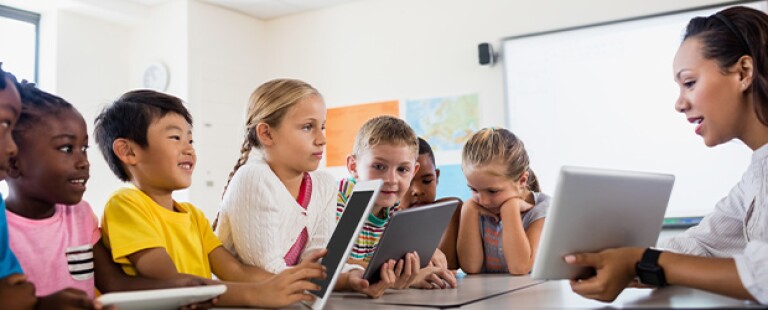Expert Tutors Offering Primary Science Tuition Singapore for All Grades
Expert Tutors Offering Primary Science Tuition Singapore for All Grades
Blog Article
Discovering the Various Mentor Techniques in Main Science Education Today
The landscape of main science education and learning is advancing, with various mentor strategies getting importance in contemporary classrooms. Inquiry-based learning, hands-on experiments, and the integration of technology are redefining just how teachers engage young minds. Additionally, joint methods and differentiated direction are being employed to satisfy the diverse needs of pupils, improving both engagement and understanding. As we analyze these approaches, questions occur concerning their efficiency and the implications for future educational practices. What might these changes in strategy mean for the next generation of students?
Inquiry-Based Discovering
Inquiry-Based Knowing (IBL) is an instructional approach that motivates students to check out clinical ideas through questioning, investigation, and hands-on experimentation. This technique emphasizes the duty of trainees as energetic individuals in their discovering, advertising important reasoning and problem-solving skills. By engaging with real-world questions, pupils become interested and motivated, which enhances their understanding of scientific concepts.
In IBL, educators work as facilitators, directing pupils as they navigate their queries as opposed to delivering info straight. This student-centered method permits differentiation, suiting different finding out styles and rates. Pupils develop skills in developing hypotheses, creating experiments, and analyzing information, which are important for scientific literacy.
Additionally, IBL cultivates cooperation amongst pupils, motivating them to share findings and ideas. This collective inquiry promotes social skills and a sense of community within the class. The procedure of inquiry motivates strength, as trainees learn to embrace failure as a tipping stone toward understanding.
Hands-On Experiments
Hands-on experiments are an important component of reliable science education and learning, matching the principles of inquiry-based understanding. These experiments enable pupils to engage straight with scientific concepts, promoting a deeper understanding via experiential understanding. By manipulating materials and observing end results, young learners can realize abstract concepts in tangible means.
Such activities promote vital thinking and analytic skills, as students assume results, conduct experiments, and analyze outcomes. This procedure urges them to ask inquiries, fine-tune their understanding, and establish a scientific way of thinking. In addition, hands-on experiments can be tailored to varied learning designs, ensuring that all students have the possibility to involve meaningfully with the web content.
Furthermore, hands-on experiments usually encourage partnership among peers, advertising synergy and communication skills. Working in teams makes it possible for students to share ideas, talk about findings, and gain from each other, which improves their general academic experience.
Integrating hands-on experiments right into the main scientific research educational program not just improves the finding out environment however likewise grows a long-lasting interest in science. By proactively taking part in their education and learning, pupils are extra most likely to create an interest for clinical query that prolongs beyond the classroom.

Modern Technology Integration
Integrating technology into main science education and learning has actually ended up being progressively essential in fostering student involvement and boosting finding out results. The use of digital devices, such as interactive simulations, online laboratories, and academic software application, offers students with opportunities to explore scientific principles in ingenious methods. These resources facilitate a much deeper understanding of complicated topics by allowing students to picture and manipulate variables that would certainly be unwise in a conventional classroom setup.
Additionally, innovation combination encourages individualized discovering experiences. Students can proceed at their own pace, taking another look at difficult concepts with multimedia resources, which provide to different learning styles. This adaptability not just sustains individual growth but additionally cultivates a feeling of autonomy in learners.
In addition, innovation works as a bridge to real-world scientific research, linking pupils with present click this link research and specialist contributions. Accessibility to clinical journals and on the internet databases widens students' perspectives on clinical questions and fosters essential thinking skills.
Collaborative Understanding
Collaborative discovering plays an essential role in main scientific research education and learning by fostering team effort and interaction abilities among trainees. This technique encourages learners to interact, share expertise, and engage in analytical, which boosts their understanding of scientific principles. By joining team tasks, pupils find out to articulate their concepts, pay attention to varied perspectives, and work out options, directory every one of which are crucial abilities in both scholastic and real-world contexts.

Study suggests that collaborative learning can cause enhanced inspiration and engagement in science topics, as students discover enjoyment in common experiences (primary science tuition Singapore). Additionally, this method prepares pupils for future collaborative undertakings, equipping them with the skills essential for efficient synergy in higher education and specialist atmospheres. Ultimately, welcoming collaborative discovering in primary scientific research education can substantially enhance the knowing experience and advertise a much deeper understanding of clinical questions
Separated Direction

Distinguished direction can materialize in different methods, such as varying the content, processes, or products of learning. For example, teachers might make use of tiered jobs that give differing levels of complexity, allowing pupils to function at their corresponding preparedness levels. Additionally, adaptable organizing techniques can assist in partnership among students with various capabilities, promoting peer knowing.
Evaluation plays a crucial function in this method, as it informs instruction and helps educators understand each student's one-of-a-kind requirements. Formative assessments, such as observations and tests, can lead teachers in changing their strategies to enhance learning results. primary science tuition Singapore. Ultimately, by applying separated instruction in main scientific research education and learning, educators can cultivate an extra effective and equitable understanding atmosphere, empowering all pupils to reach their complete capacity in recognizing scientific sensations
Conclusion
In summary, the varied teaching techniques in main science education and learning, including inquiry-based learning, hands-on experiments, modern technology integration, collective understanding, and distinguished guideline, jointly add to a more efficient understanding environment. These methods promote essential thinking, problem-solving skills, and a deeper comprehension of scientific principles. By implementing these strategies, educators can produce interesting and supportive class that address the varied needs of pupils, ultimately promoting a long-lasting passion in science and enhancing academic success.
Inquiry-Based Discovering (IBL) is an instructional approach that urges students to check out scientific principles through wondering about, examination, and hands-on trial and error.Joint knowing plays a vital role in primary science education and learning by cultivating teamwork more helpful hints and interaction skills among trainees.Research indicates that joint discovering can lead to enhanced motivation and involvement in science subjects, as pupils discover enjoyment in common experiences.In promoting an inclusive understanding setting, separated instruction arises as a crucial strategy to suit the diverse needs and capabilities of students in key science education. Eventually, by executing set apart guideline in key scientific research education, teachers can cultivate a much more equitable and reliable understanding atmosphere, empowering all pupils to reach their complete potential in recognizing clinical sensations.
Report this page